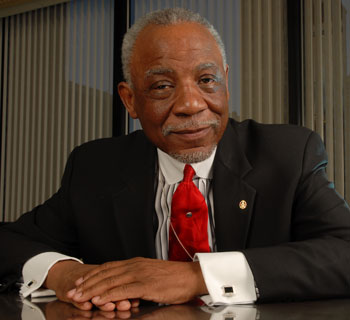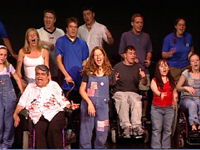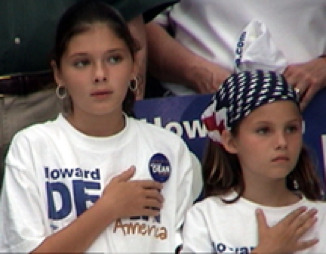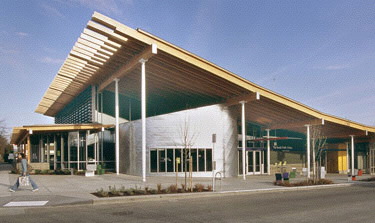
The Purpose Prize honors “what may be a new trend — retirees taking on some of the country’s biggest social problems.”
The five winners of the first-ever Purpose Prize, all 60 years or older, will split half a million dollars.
“The finalists include a used-car salesman who now provides low-interest car loans to the poor, a retired CEO who helps poor kids get to college, and a woman who uses her antique store to give job training to people who have some of the worst job prospects.” …
Civic Ventures, a San Francisco think tank, sponsored the new initiative to invest in Americans who are leading a new age of social innovation. Using their experience and entrepreneurial skills in the second half of life, they are helping to solve long-standing problems, including intolerance, racial disparities in preventable deaths, job opportunities for the disabled, housing needs of the elderly poor, and the disrupted lives of millions of children who have a parent in jail.
”It’s conventional wisdom that young people drive entrepreneurialism and innovation, but the Purpose Prize winners turn that outdated notion on its head,” said Marc Freedman, founder and President of Civic Ventures. “These inspiring men and women illustrate an emerging trend in our society, as millions of aging Americans turn their experience and passion for change into meaningful work in their later years”
“Today’s boomers and older Americans are an extraordinary pool of social and human capital that – with the right investment – could yield unprecedented returns for society,” said Freedman. “Instead of being a lifetime achievement award, the Purpose Prize is an investment in what these amazing individuals will do next to solve important problems.”
The $100,000 winners – selected by a jury comprised of 21 leaders in business, politics, journalism, the arts, and the nonprofit sector – include:
- Conchy Bretos (age 61, Miami, FL):
Bringing assisted living services to public housing
Born in Cuba and sent to America when Castro came to power, Bretos lived in a Nebraska orphanage for three years before reuniting with her parents. As an adult, she worked university and public sector jobs, then became Florida’s Secretary for Aging and Adult Services. Appalled to see what poor, older adults endured to avoid nursing homes, she became the force behind the nation’s first public housing project – the Helen Sawyer building in Miami – to bring assisted-living services to low-income adults who need help to stay in their homes. Today she runs a consulting company that has helped 40 public housing projects in a dozen states bring assisted-living services to their residents.
- Charles Dey (age 75, Lyme, CT):
Engaging high school youth with disabilities in the world of work
At 64, Dey had a long career in education and a record of starting programs to ensure equal educational opportunity. Alan Reich, a friend who founded the National Organization on Disability after an accident left him a quadriplegic, told Dey to “do for young people with disabilities what you did for minorities in the ’60s.” Dey created Start on Success, a National Organization on Disability program providing paid internships and workplace mentors to predominantly minority high school students with physical, mental and emotional disabilities. Over 1,500 students have had internships at universities, hospitals and businesses in five cities, and 85 percent have gone on to full-time jobs or further education. Dey is working to expand Start on Success, while also building the National Organization on Disability’s efforts to help disabled adults, including returning veterans, find jobs.
- Marilyn Gaston and Gayle Porter (ages 67 and 60, Bethesda, MD) :
Empowering midlife African-American women to improve their health
With African-American women dying at rates greater than any other group of U.S. women, Gaston and Porter were inspired to stop many of these preventable deaths. Accomplished health professionals, they created Prime Time Sister Circles – part support group and part health course on exercise, nutrition and stress. The meetings, taking place in convenient locations like churches and community centers, encourage goal-setting, peer support and empowerment to change how African-American women approach their health and the health of their families and communities. Research in four cities shows that 68 percent of participants maintain improved health.
- W. Wilson Goode, Sr. (age 68, Philadelphia, PA–pictured above):
Mentoring children of incarcerated parents
In 2000, former Philadelphia Mayor (1984-1992) Wilson Goode earned a Doctorate of Ministry and became the director of Amachi, a nonprofit helping the 7 million children who have one or both parents in jail, on parole or under supervision. Goode, whose own father went to jail for assaulting his mother when Goode was 14, paired mentoring with faith-based recruiting. He rallied pastors in African-American communities to encourage their congregants to be mentors. Today more than 240 programs in 48 states are affiliated or inspired by Amachi, and mentors have helped 30,000 children. Without intervention, experts predict that as many as 70 percent of children with incarcerated parents would end up in jail.
- Judea Pearl and Akbar Ahmed (ages 70 and 63, Los Angeles and Washington, D.C.):
Fighting intolerance, conflict and terrorism through dialogue and exchange
After terrorists murdered his son, Wall Street Journal reporter Daniel Pearl, Judea Pearl, a computer science professor at UCLA, teamed up with Akbar Ahmed, a professor of Islamic Studies and envoy to Muslims in the U.S. and abroad. The two travel the country to speak and lead dialogues on religious tolerance, linking their stories to a call for reconciliation and providing a rare forum for moderate Muslims in the U.S. Dialogue is central to the work of the Daniel Pearl Foundation, which sponsors fellowships for journalists and an Internet news service for high school journalists, advocates press freedom, and organizes world music days to bring diverse people together.
The ten $10,000 winners are:
- Frank Brady, 63 (Paterson, NJ): Improving children’s access to healthcare through technology
- Robert Chambers, 61 (Lebanon, NH): Providing low-interest car loans to the rural poor
- Bernard Flynn, 71 (Sacramento, CA): Restoring river ecosystems for sustainable flood control and habitat preservation
- Benjamin Hooks, 81 (Memphis, TN): Preventing childhood exposure to lead poisoning
- Dagney Jochem, 64 (Raleigh, NC): Bringing HIV/AIDS education, prevention and care to rural minorities
- James Ketelsen, 75 (Houston, TX): Helping disadvantaged youth to graduate high school and enroll in college
- Suzanne Mintz, 60 (Kensington, MD): Giving a voice to America’s family caregivers
- Martha Franck Rollins, 63 (Richmond, VA): Restoring community vitality and helping ex-prisoners more productively re-enter society
- June Simmons, 64 (San Fernando, CA): Creating, implementing and evaluating new ways of delivering health care
- Herb Sturz, 75 (New York, NY): Expanding after-school care and tapping older adults for community service
The five $100,000 Purpose Prize winners and ten $10,000 winners can also apply for support of their work from Civic Ventures’ new million-dollar Fund for Innovation. Two foundations,
The Atlantic Philanthropies and
The John Templeton Foundation, provided funding to Civic Ventures for the Prize program and the new Fund.
Seventy innovators – the top five percent of the 1,200 Purpose Prize applicants – have been invited to participate in a “Purpose Prize Innovation Summit,” September 7-9, at Stanford University in Palo Alto, California. The event is cosponsored by Civic Ventures and the Stanford Graduate School of Business’ Center on Social Innovation, one of the world’s leading academic centers focused on social entrepreneurship.
At the Summit, social innovators can learn from presenters and one another, build a network that will link and support innovators working in the second half of life, discuss ideas with funders and venture philanthropists, and explore how individual efforts can create a wave of social innovation that could transform America.
(See some video at NPR’s All Things Considered)
 A new campaign to create personal peace in an ever-intensifying global climate of chaos and change is being launched this Sunday at London’s Wembley Arena and around the world with an internet simulcast. Entitled just-a-minute (j-a-m), the initiative introduces regular one-minute periods of silence into peoples lives, whether stressed out executives, social activists or busy moms, and includes multi-media tools such as one minute spoken meditations to download onto computers or podcast…
A new campaign to create personal peace in an ever-intensifying global climate of chaos and change is being launched this Sunday at London’s Wembley Arena and around the world with an internet simulcast. Entitled just-a-minute (j-a-m), the initiative introduces regular one-minute periods of silence into peoples lives, whether stressed out executives, social activists or busy moms, and includes multi-media tools such as one minute spoken meditations to download onto computers or podcast…
























 Take a look at some of the world’s most amazing biodegradable products, from baby wipes to kitchen bowls and cell phones. (
Take a look at some of the world’s most amazing biodegradable products, from baby wipes to kitchen bowls and cell phones. (


 This summer, the American Institute of Architects and its Committee on the Environment selected the top ten examples of sustainable architecture and green design solutions that protect and enhance the environment. The Top Ten Green Projects make a positive contribution to their community by improving comfort for building occupants, while reducing environmental impacts through strategies such as: connection to transit systems, energy and water conservation, use of sustainable or renewable construction materials, and improvement of indoor air quality…
This summer, the American Institute of Architects and its Committee on the Environment selected the top ten examples of sustainable architecture and green design solutions that protect and enhance the environment. The Top Ten Green Projects make a positive contribution to their community by improving comfort for building occupants, while reducing environmental impacts through strategies such as: connection to transit systems, energy and water conservation, use of sustainable or renewable construction materials, and improvement of indoor air quality… 
